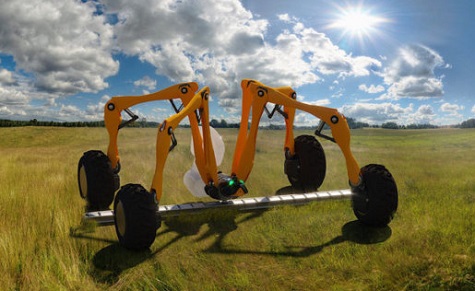Last week, Steve Gibbs asked about the future for ag dealers as more and more robotic agricultural equipment is developed. He referenced the rapid progress of the Small Robot Company who have just crowdfunded a further £2 million to support future development and manufacturing plans. SRC have now raised £4.84million from investors.
Commenting, lead investor 7percent said “we will never be interested unless we view an investment as a billion-dollar opportunity” adding “change is not an option, we need to fundamentally disrupt existing practices.”

Current initiatives such as the Hands Free Hectare project at Harper Adams, the work that Lincoln University is doing on robotic solutions to harvesting and fruit picking - plus dozens of other specialised R&D developments aimed at providing robotic answers to farming operations – and it is clear that change is all around.
Global investment in new agri-tech/agri-food technology is running at record levels. According to AgFunder, current annual investment is annually at over $17 billion and growing at more than 40% year-on-year.
So, it’s all kicking off! Hail the fourth agricultural revolution.
Of course, not all these projects will see the light of day. There are too many clever inventions in search of an application! Very few, if any, will become stand-alone suppliers. Well-funded, independent technology companies will be supplementing the work of tractor and machinery manufacturers R&D departments, allowing them to carefully cherry-pick the most appropriate acquisitions to add to their portfolio.
In recent times we’ve seen Deere introduce its Farmsight programme and add Blue River Technology’s smart spraying solutions, AGCO has launched its Fuse platform with subsidiary Fendt working on small swarm robots. CNH has introduced its AGXTEND precision farming technology brand, whilst Kubota recently unveiled an extraordinary looking concept electric autonomous tractor.
So how will this impact on the ag dealer of today? We are already witnessing a consolidation of the dealer network. Multi-branch dealerships set up and equipped to handle and support new technologies, often staffed by graduate-level staff.
These dealers will continue to support new machine technology as it is introduced by their suppliers. They will be well-versed in understanding and implementing ‘big data’ in order to maximise yields etc. They will act as a partner to their customers in achieving farm efficiencies.
However, a rapid transition to new technologies will not be the revolution that many predict. At the recent Institution of Agricultural Engineers (IAgrE) conference speaker after speaker admitted that the majority of farmers were not yet convinced by precision farming.
The best farmers have always had an empathy for their profession, they live and breath it, they cope with the uncontrollables, such as weather. Agriculture is rarely an exact science, human intervention will always trump automation.
Likewise, ag dealers have always been at the forefront of implementing change. Over the years, they have professionally responded to advances in hydraulics, power units, electronics, transmissions, guidance systems. They have acted as the essential go-between. Ensuring new technologies developed by global manufacturers are used to best effect by local farmers.
In today’s world, the farmer needs fast diagnosis, predictive and proactive maintenance regimes. Analytics to provide this are becoming increasingly common within dealerships. As are robotics in dairy parlours, and in feeding operations. Change is all around, but it will be evolutionary rather than revolutionary.
So, what about the smaller dealers? They will also have an incredibly important role to play where localised service is important to support small and mixed farming. Alongside agriculture, there is an important role for dealers to play in the care of the countryside, forestry, water management, sports and recreation areas.
In summary, todays ag dealer is arguably more important than ever in implementing and supporting new technologies. But they need to be proactive. There will be an increasing need to recruit new skills to support this new digital, analytical and automated age – and the dealer network must sell itself to attract high calibre staff with skills virtually unknown just a few years ago.